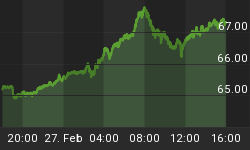Protectionism is on the rise in the U.S. - can we afford it? If we tell our trading partners that their money is not welcome, they should be excused if they invest elsewhere. Because of its massive current account deficit, the United States must attract over US$2 billion in foreign investments every day to keep the dollar from falling. To illustrate why we should be concerned about a potential decline in the dollar, look at inflation: just about everything around us has been getting more expensive, except for the goods we can import. As the dollar falls, inflation - and with it interest rates - may pick up significantly.
As China sold over $200 billion more in goods to the U.S. than it acquired, its foreign currency reserves swelled to over $800 billion (not just US dollar reserves). Foreigners have had an incentive to keep their currencies weak to promote exports to the United States. Rather than merely buying U.S. Treasury securities, foreigners have shown an increased appetite for real assets. At the same time, with politicians instilling xenophobia into Americans, isolationist sentiment has grown. With mid-term elections later this year, politicians across the political spectrum jump at the opportunity to stir the paranoia; even some moderate commentators have referred to the trend as jingoism.
DP World, the United Arab Emirate (UAE) based port operator, has given up its quest to gain control of numerous US port terminals. Never mind that the previous owner was also a foreign firm; never mind that DP World has the best reputation in the business; never mind, that, according to the Wall Street Journal, "more than 60% of the container terminals at the nation's 10 busiest ports are at least partly managed by foreign operators, and in some cases, companies controlled by foreign governments. That figure rises to 80% at the biggest ports..."
Foreigners do not vote, so why bother stepping up for them? Labor Secretary Elaine Chow put it bluntly: "We are after all a debtor nation!" (interview on CNBC March 10, 2006). Not only that, but she also confirmed that between 22 and 29 million jobs in the US are dependent on trade. Rarely has the US been so vulnerable. One of the beauties of the US economy is that it can adjust to new environments: a lot of businesses facilitate trade these days. If trade barriers are imposed now, then we have not only lost the manufacturing base through outsourcing, but will destroy the jobs of those who have been able to adapt. We should have learned our lessons from the Great Depression: there, protectionism deepened the hardship on people. Today, we are just at the beginning of an economic downturn - a downturn few economists even acknowledge at this stage - and we are already playing the blame game.
Last summer, the Chinese controlled oil conglomerate CNOOC was in the media as it tried to acquire US-based Unocal. There, too, the political firestorm that resulted caused CNOOC to abandon the deal. It shall be noted that CNOOC was only interested in non-US assets with no direct impact on oil produced for the US market. At the time, we published a cynical note entitled "China: U.S. Dollar may not be Worth the Paper it is Printed on" - the essence of the article was: if you can't buy anything of use with your dollars, why bother holding them? Indeed, the Chinese have since ventured beyond the U.S. to secure their natural resource needs in Canada, Latin America and Australia. Last year, China has started to partner with India on some acquisitions. And in Africa, China has provided development aid in return for increased access to natural resources.
There may well be room for improvement in the process of how international transactions are approved. But rather than squarely blaming foreigners, it may be helpful to start by evaluating domestic policies that have contributed to creating unprecedented liabilities to US consumers, have accelerated outsourcing and made the US dependent on foreign capital.
Protectionism is not a US invention; indeed, globally, there are increased calls for protectionism. France is well known to "defend" its home industry. The European Union may import tariffs because Asian sneakers are "too cheap". China plays its own games - most recently, it warned steel importers not to bid up prices; steel exporters, such as Australia, have protested. Argentina, well known for high quality beef exports, has announced a ban on beef exports in an effort to contain domestic inflation.
Some say the US faces little risk in alienating the rest of the world - with huge investments in US Treasuries, foreigners have more to lose than to gain from turning their back on the US. We agree that it is unlikely that foreigners would overnight sell all their US holdings and cause a panic. However, the US is dependent on foreigners investing in US assets at a rate of over $2 billion every day to keep the dollar from falling. Changes in investment allocations only need to happen at the margin to hurt the US dollar. The US is certainly trying very hard to encourage foreign investors to reconsider; these efforts are "bearing fruit": on March 12, the UAE central bank said it was looking to convert up to 10 percent of its foreign exchange reserves from dollars into euros - double the target it had previously set. The reserves have previously been held almost entirely in dollars.
We manage the Merk Hard Currency Fund, a fund that seeks to profit from a potential decline in the dollar. To learn more about the Fund, or to subscribe to our free newsletter, please visit www.merkfund.com.















